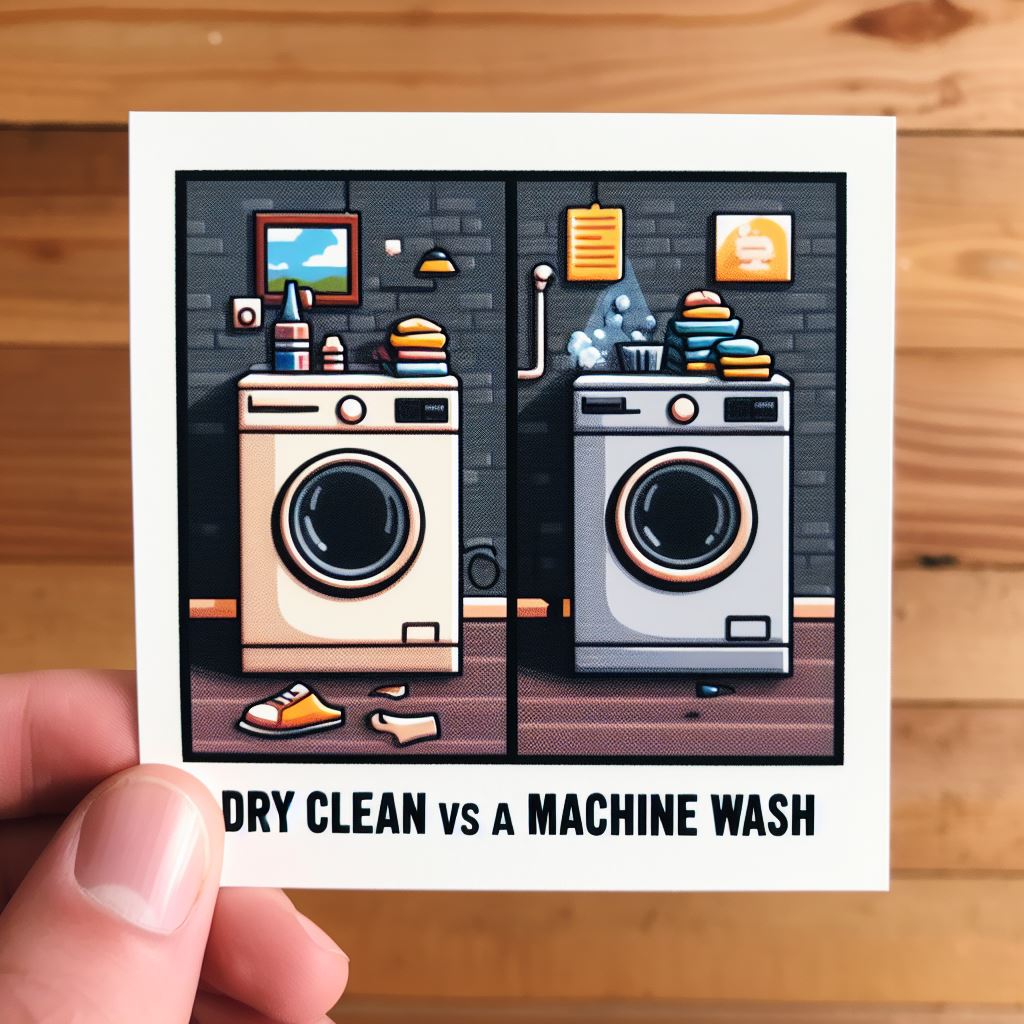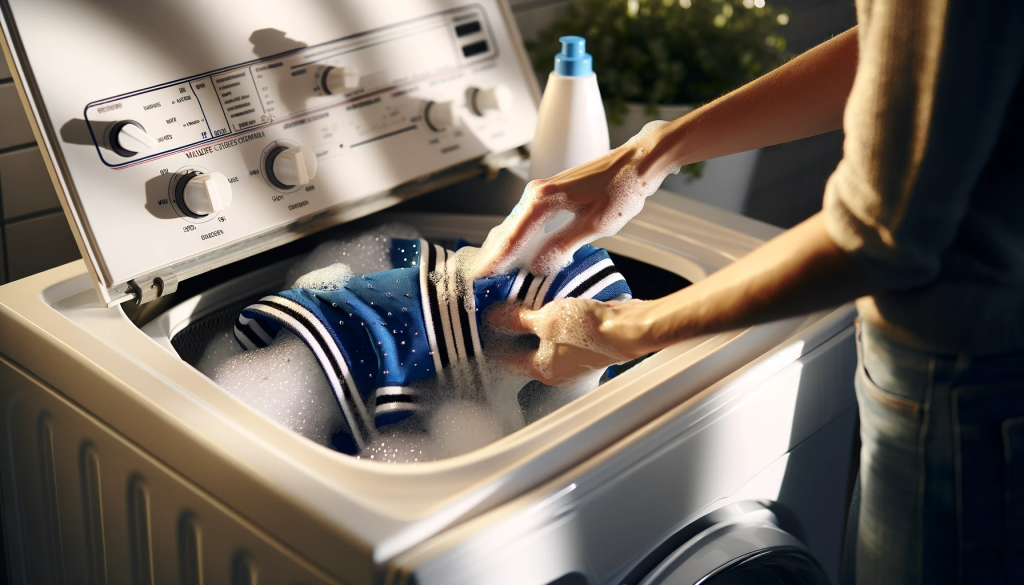Understanding the nuanced differences between dry cleaning and machine washing can save your garments from premature wear and tear, ensuring they maintain their original allure. Whether you’re dealing with delicate fabrics or pesky stains, knowing when to opt for each method is vital. For stylish and durable clothing that withstands any cleaning challenge, explore the latest collections at InktasticMerch.
Deciphering whether to dry clean or machine wash your cherished clothes is often a puzzling task. Did you realize that using improper washing techniques could seriously compromise certain fabrics? This blog post delves into the essential distinctions between these two cleaning methods, aiding you in making an informed choice based on fabric type, stain severity, and durability.
Stick with us as we unravel the intricacies of laundry; your wardrobe will be grateful!
Key Takeaways
- Dry cleaning utilizes chemical solvents to efficiently manage grease and oil stains without causing shrinkage or fading, whereas machine washing typically involves water and detergent.
- Dry cleaning involves an industrial machine that tumbles clothes to evaporate solvents and avert wrinkles. In machine washing, clothes are spun at high speeds to extract water before they are either air-dried or heat-dried.
- Machine washing is suitable for common stains like dirt or food spills, whereas dry cleaning is more adept at handling stubborn stains, such as ink or lipstick, especially on delicate materials.
- Home washing is both convenient and budget-friendly but may not cater to delicate fabrics or difficult stains. Meanwhile, dry cleaning provides gentle care and efficient stain removal but can be costly and possibly hazardous due to toxic solvents used.
The Main Differences Between Washing and Dry Cleaning
This section explores the major differences between washing and dry cleaning, focusing on four critical areas: solvents, drying methods, overall process, and stain removal techniques. Let’s explore each aspect for clarity:
Solvents Used
- Dry cleaning mainly relies on chemical solvents like perchloroethylene for removing grease and oil stains without causing the fabric to shrink or fade.
- Washing utilizes water and detergent, which may be less effective for oil-based stains.
Drying Method
- In dry cleaning, “tumbling” rotates clothes to evaporate solvents, assisting in wrinkle reduction.
- Machine washing involves a process of spinning clothes rapidly to remove water, with different fabrics requiring specific air-drying or heat-drying procedures.
Process
- Dry cleaning is a solvent-based technique where garments are saturated in perchloroethylene, then tumbled to remove the solvent.
- Machine washing employs water and detergents, focusing on stain removal via agitation and controlled heating according to fabric needs.
Stain Removal
- Machine washing efficiently handles everyday stains like dirt or food due to the presence of water and agitation.
- Dry cleaning excels at eliminating challenging stains such as ink or lipstick thanks to its chemical solvent use.
Pros and Cons of Washing vs Dry Cleaning

Washing clothes at home offers convenience and cost savings but may not cater well to delicate items or tough stains. Conversely, dry cleaning provides a gentle touch and effective stain management but can be pricey and potentially problematic due to the toxic solvents involved.
due to toxic solvents.
To choose the best cleaning method for your garments, consider the fabric type, the severity of stains, and the fabric’s durability. For more insights into the advantages and disadvantages of washing versus dry cleaning, explore our blog!
Advantages of Washing
Utilizing a washing machine brings numerous advantages. Firstly, it effectively eliminates dirt, stains, and odors, ensuring your clothes are left pristine and refreshed. The convenience of machine washing is unmatched, allowing you to simply load your garments and let the machine do its work.
This method saves considerable time compared to dry cleaning, as there’s no need to wait for professional services. Furthermore, home washing with water-based detergents is typically deemed safer and more environmentally friendly than using toxic chemicals in dry cleaning.
All in all, machine washing presents an efficient and budget-friendly way to maintain the cleanliness and upkeep of your daily wear with minimal fuss or added cost.
Disadvantages of Washing
Despite its conveniences, washing clothes in a machine has its downsides. Particularly, delicate fabrics like silk or wool can suffer damage during the process.
The machine’s agitation and tumbling can cause fragile materials to shrink, stretch, or tear. Additionally, some stains may resist removal through regular washing techniques.
Persistently stubborn stains, such as those from oil or ink, may necessitate specialized treatments. Over time, frequent machine washing can also lead to faded colors and a loss of shape and texture in garments.
Advantages of Dry Cleaning
Dry cleaning boasts several benefits over conventional machine washing. It excels at extracting persistent stains that ordinary laundering might not resolve, thanks to the specialized solvents and chemicals used in the process. These solutions ensure thorough stain removal while keeping delicate fabrics safe and intact.
Dry cleaning also minimizes the risk of shrinking or discoloring, making it an excellent choice for preserving the quality and appearance of cherished clothing items.
By adhering to care instructions and opting for dry cleaning when needed, you can prolong the life of your garments and keep them looking their best.
Disadvantages of Dry Cleaning
Before opting for dry cleaning, weigh its potential drawbacks. It is generally more expensive than machine washing, due to the necessity of specialized equipment and solvents. Furthermore, some chemicals used in traditional dry cleaning can be hazardous to both the environment and personal health.
Moreover, certain sensitive fabrics may not withstand the rigorous treatment of dry cleaning chemicals, risking damage or discoloration.
Deciding the Best Method
When determining how best to clean your clothing, it’s vital to consider the fabric type, the nature of the stains, and how durable the garment is. These factors will help you decide between washing and dry cleaning.
Fabric Considerations
Before deciding on washing or dry cleaning, take into account the fabric your garments are made from, as each comes with specific care needs. Understanding these requirements will guide you in choosing the right cleaning method.
Delicate fabrics, such as silk, wool, or lace, often benefit from dry cleaning to avoid potential damage from machine washing. On the other hand,Sturdier fabrics like cotton or polyester are often safe to toss in the washing machine without any concerns. To keep your clothes in top condition, it’s crucial to consider the fabric’s traits and follow the specific care instructions. This approach will help maintain the cleanliness, quality, and lifespan of your garments.
Stain Type
The nature of the stain greatly influences your choice of cleaning method. Some stains are more effectively tackled through either machine washing or dry cleaning. For example, oil-based stains like grease or motor oil tend to be best removed with dry cleaning due to its use of chemical solvents. Conversely, water-based stains such as coffee or juice often respond better to machine washing with detergent and water. Identifying the type of stain will guide you in choosing whether to wash or dry clean your clothing for the best results in stain removal.
Durability
Machine washing can be harsh on certain fabrics, diminishing their durability over time. The agitation from the washing machine can lead to wear and tear, particularly on delicate fabrics. In contrast, dry cleaning is a gentler process, preserving your garments’ longevity. Since dry cleaning employs chemical solvents rather than water, fabrics are protected from harsh mechanical actions. This makes dry cleaning a suitable option for delicate or heavily embellished items that might not endure the vigorous nature of machine washing. When considering durability, picking the right cleaning method for your specific garments is vital to ensure they remain in excellent condition.
Conclusion
Your decision between washing and dry cleaning significantly affects the lifespan and appearance of your clothes. Understanding the nuances of these cleaning methods is key to making well-informed decisions. Machine washing is an efficient, cost-friendly option for everyday wear, cleaning effectively and rapidly. However, it may not suit delicate fabrics or persistent stains, and excessive use can lead to fabric damage over time.
In comparison, dry cleaning excels in eliminating stains and is tender on delicate fabrics, preventing shrinkage and discoloration. Nevertheless, it can be costly and raise environmental concerns, and it’s not always necessary for every piece of clothing. To make the most informed choice, consider factors such as fabric type, stain characteristics, and garment durability. By doing so, you ensure your clothes receive the best care, sustaining their quality and appearance over time. Whether you embrace the convenience of machine washing or the thoroughness of dry cleaning, your garments will benefit from the attention they receive.
FAQs
1. What is the difference between dry cleaning and machine washing?
Dry cleaning employs a chemical solvent to clean clothes, whereas machine washing uses water, detergent, and agitation.
2. Can I dry clean all types of clothing?
Though most garments are suitable for dry cleaning, some delicate fabrics or those with unique care instructions might not be appropriate for this method. Always review the garment’s label or seek advice from a professional cleaner.
3. Is machine washing more effective than dry cleaning?
The success of either method relies on the fabric type and the specific stains or dirt on the garment. Certain stains are more effectively removed through dry cleaning, while others benefit from soaking and agitation in the washing machine.
4. Which method is more cost-effective: dry cleaning or machine washing?
Typically, machine washing is less costly than regular visits to the dry cleaner. Nonetheless, consider factors such as time, convenience, and the potential for damage to delicate garments when determining which method is more economical for you.
5. How do I determine whether a garment should be dry cleaned or machine washed?
Always check the garment’s care label for specific washing instructions from the manufacturer. If instructions are unclear or you are uncertain about how to proceed, consult with a professional cleaner for advice.




